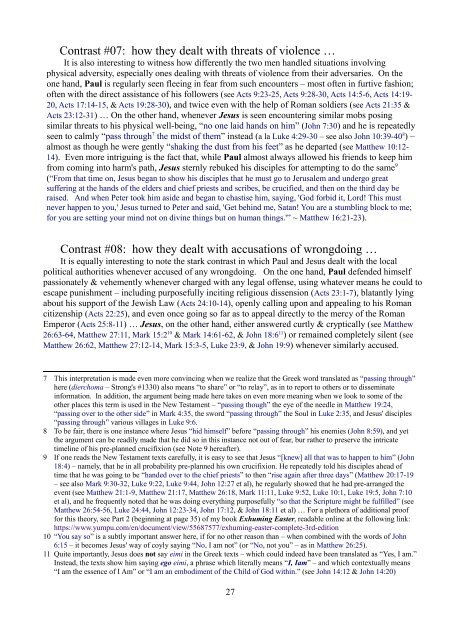The Cult of Paul
an exhaustive biblical examination of the starkly contrasting lives, values, & theologies of Jesus Christ and Paul -- Jesus' most zealous “apostle,” and the true father of the modern-day Christian church
an exhaustive biblical examination of the starkly contrasting lives, values, & theologies of Jesus Christ and Paul -- Jesus' most zealous “apostle,” and the true father of the modern-day Christian church
Create successful ePaper yourself
Turn your PDF publications into a flip-book with our unique Google optimized e-Paper software.
Contrast #07: how they dealt with threats <strong>of</strong> violence …<br />
It is also interesting to witness how differently the two men handled situations involving<br />
physical adversity, especially ones dealing with threats <strong>of</strong> violence from their adversaries. On the<br />
one hand, <strong>Paul</strong> is regularly seen fleeing in fear from such encounters – most <strong>of</strong>ten in furtive fashion;<br />
<strong>of</strong>ten with the direct assistance <strong>of</strong> his followers (see Acts 9:23-25, Acts 9:28-30, Acts 14:5-6, Acts 14:19-<br />
20, Acts 17:14-15, & Acts 19:28-30), and twice even with the help <strong>of</strong> Roman soldiers (see Acts 21:35 &<br />
Acts 23:12-31) … On the other hand, whenever Jesus is seen encountering similar mobs posing<br />
similar threats to his physical well-being, “no one laid hands on him” (John 7:30) and he is repeatedly<br />
seen to calmly “pass through 7 the midst <strong>of</strong> them” instead (a la Luke 4:29-30 – see also John 10:39-40 8 ) –<br />
almost as though he were gently “shaking the dust from his feet” as he departed (see Matthew 10:12-<br />
14). Even more intriguing is the fact that, while <strong>Paul</strong> almost always allowed his friends to keep him<br />
from coming into harm's path, Jesus sternly rebuked his disciples for attempting to do the same 9<br />
(“From that time on, Jesus began to show his disciples that he must go to Jerusalem and undergo great<br />
suffering at the hands <strong>of</strong> the elders and chief priests and scribes, be crucified, and then on the third day be<br />
raised. And when Peter took him aside and began to chastise him, saying, 'God forbid it, Lord! This must<br />
never happen to you,' Jesus turned to Peter and said, 'Get behind me, Satan! You are a stumbling block to me;<br />
for you are setting your mind not on divine things but on human things.'” ~ Matthew 16:21-23).<br />
Contrast #08: how they dealt with accusations <strong>of</strong> wrongdoing …<br />
It is equally interesting to note the stark contrast in which <strong>Paul</strong> and Jesus dealt with the local<br />
political authorities whenever accused <strong>of</strong> any wrongdoing. On the one hand, <strong>Paul</strong> defended himself<br />
passionately & vehemently whenever charged with any legal <strong>of</strong>fense, using whatever means he could to<br />
escape punishment – including purposefully inciting religious dissension (Acts 23:1-7), blatantly lying<br />
about his support <strong>of</strong> the Jewish Law (Acts 24:10-14), openly calling upon and appealing to his Roman<br />
citizenship (Acts 22:25), and even once going so far as to appeal directly to the mercy <strong>of</strong> the Roman<br />
Emperor (Acts 25:8-11) … Jesus, on the other hand, either answered curtly & cryptically (see Matthew<br />
26:63-64, Matthew 27:11, Mark 15:2 10 & Mark 14:61-62, & John 18:6 11 ) or remained completely silent (see<br />
Matthew 26:62, Matthew 27:12-14, Mark 15:3-5, Luke 23:9, & John 19:9) whenever similarly accused.<br />
7 This interpretation is made even more convincing when we realize that the Greek word translated as “passing through”<br />
here (dierchoma – Strong's #1330) also means “to share” or “to relay”, as in to report to others or to disseminate<br />
information. In addition, the argument being made here takes on even more meaning when we look to some <strong>of</strong> the<br />
other places this term is used in the New Testament – “passing though” the eye <strong>of</strong> the needle in Matthew 19:24,<br />
“passing over to the other side” in Mark 4:35, the sword “passing through” the Soul in Luke 2:35, and Jesus' disciples<br />
“passing through” various villages in Luke 9:6.<br />
8 To be fair, there is one instance where Jesus “hid himself” before “passing through” his enemies (John 8:59), and yet<br />
the argument can be readily made that he did so in this instance not out <strong>of</strong> fear, bur rather to preserve the intricate<br />
timeline <strong>of</strong> his pre-planned crucifixion (see Note 9 hereafter).<br />
9 If one reads the New Testament texts carefully, it is easy to see that Jesus “[knew] all that was to happen to him” (John<br />
18:4) – namely, that he in all probability pre-planned his own crucifixion. He repeatedly told his disciples ahead <strong>of</strong><br />
time that he was going to be “handed over to the chief priests” to then “rise again after three days” (Matthew 20:17-19<br />
– see also Mark 9:30-32, Luke 9:22, Luke 9:44, John 12:27 et al), he regularly showed that he had pre-arranged the<br />
event (see Matthew 21:1-9, Matthew 21:17, Matthew 26:18, Mark 11:11, Luke 9:52, Luke 10:1, Luke 19:5, John 7:10<br />
et al), and he frequently noted that he was doing everything purposefully “so that the Scripture might be fulfilled” (see<br />
Matthew 26:54-56, Luke 24:44, John 12:23-34, John 17:12, & John 18:11 et al) … For a plethora <strong>of</strong> additional pro<strong>of</strong><br />
for this theory, see Part 2 (beginning at page 35) <strong>of</strong> my book Exhuming Easter, readable online at the following link:<br />
https://www.yumpu.com/en/document/view/55687577/exhuming-easter-complete-3rd-edition<br />
10 “You say so” is a subtly important answer here, if for no other reason than – when combined with the words <strong>of</strong> John<br />
6:15 – it becomes Jesus' way <strong>of</strong> coyly saying “No, I am not” (or “No, not you” – as in Matthew 26:25).<br />
11 Quite importantly, Jesus does not say eimi in the Greek texts – which could indeed have been translated as “Yes, I am.”<br />
Instead, the texts show him saying ego eimi, a phrase which literally means “I, Iam” – and which contextually means<br />
“I am the essence <strong>of</strong> I Am” or “I am an embodiment <strong>of</strong> the Child <strong>of</strong> God within.” (see John 14:12 & John 14:20)<br />
27

















